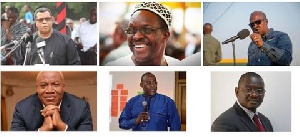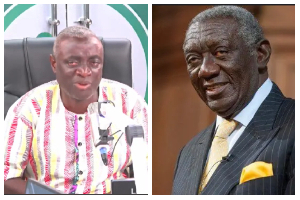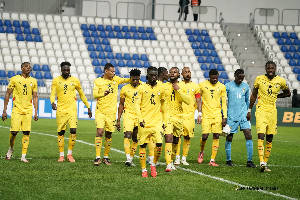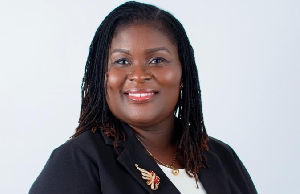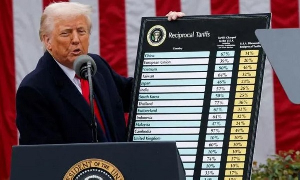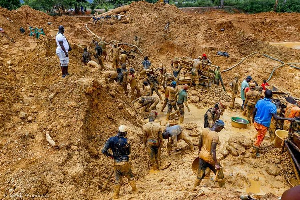Events in the NDC today bear an uncomfortable resemblance to the events of the late 90s that eventually led to the party’s first political defeat.
Once again, we are witnessing a battle for the soul of the party between the Executive or Bureaucratic Tendency (BT) which believes in a top-down paternalistic approach and prefers to subordinate the masses to the State/Officialdom and the Democratic Tendency (DT) which believes in a bottom-up approach with the masses empowered to set direction for the State.
The BT comprises the Presidency and appointees, and the DT are the progressive leadership and dedicated membership of the party.
The Cantonments Declaration by the regional chairmen, like the Swedru Declaration by then President and his allies, is an attempt to entrench the power of the BT. In the late 90s, the views of the DT were largely represented by the Reform Movement, which eventually broke away to form the National Reform Party.
It took the return of the Reform Movement and other breakaway factions for the NDC to again win an election in 2008. But did this change the dynamics in the party in anyway?
I argue that the dynamics in the party has not changed much, and the struggle between the DT and BT is as raging today as it was in the 1990s. However unlike in 1990s, the DT today needs to take a stance in the party and work to strengthen the grassroots structures and save the soul of the party.
The following is an update of my 1997 article. The contents and arguments are as relevant today as they were in 1997, 20 years on. History always repeats itself, how will we handle it this time round?
The struggle in the NDC
20 years ago, the key question I asked was “Where is the NDC going?”.
Looking back, it would appear the NDC has been marking time, and the decisions that needed to have been taken in 1997, are still outstanding.
The concerns raised by party grassroots today which eventually led to the defeat of the party in the 2016 polls are not different from the concerns 20 years ago.
Lack of internal party democracy; increasing subordination of the party government (or cliques within government); drift in economic management; and the failure of the leadership to address allegations of corruption, arrogance and lawlessness on the part of political appointees all sound familiar. These were verbatim, the same concerns raised back in 1997.
As mentioned in the preamble, the recent machinations to entrench certain leaderships is a symptom of the battle for the soul of the NDC between the “democratic” and “bureaucratic or executive” tendencies that have existed since its creation. Let us look at these tendencies.
The NDC Democratic Tendency for the most part emerged from the nation-wide consultation amongst progressive activists between 1990 and 1992. This involved pro PNDC progressives as well as older activists and leaders particularly from the CPP.
These were people in many cases opposed to the 31st December coup d’état, the “excesses” of the revolution and the growing intolerance of the PNDC.
There was substantial common ground: recognition that constitutional stability could only be based on the gains made by democratic and productive forces under the PNDC (with recognition for genuine victims of PNDC injustice) and a desire to transcend the bureaucratic populist politics of both the CPP and PNDC. Only a party with a more vigorous and powerful base could release and channel the energy and ideas needed to build the new Ghana.
Activists then promoted community pressure groups to protect the “democracy and development” gains made by the mass movement during the PNDC era. It was at this level of party construction that the “unity stability development” platform, the “Akatamanso” symbol and the party constitution with its strong emphasis on democratic processes were developed.
Community groups then linked up developing constituency, district and regional identity. The result was the “sudden” emergence of regional associations such as the Development Unions (DU), “the Front” and the “Fun club” as the dominant force on the political landscape in mid-1992. The process of bottom-up party construction had proved a phenomenal success. It however suffered a setback with the arrival of the Executive Tendency after June 1992.
The Bureaucratic or Executive Tendency emerged from the PNDC bureaucracy. Key functionaries who had been promoting either EAGLE or “NCP” as vehicles for “continuity” abandoned these options after June 1992 in favour of the obviously stronger alternative. As individual progressives, of course these had as much right as anyone else to participate in party building. As a group with a more authoritarian and bureaucratic political culture then integration into the party was problematic.
To secure Chairman Rawlings’ name on the party ticket and avoid a clash that could harm party electoral ambitions, the Democratic Tendency made tactical compromises. It accepted limitations to the character and scope of debate at the 1992 congress – allowing it to run largely as a “media spectacle”/ “jamboree”. It accepted the proposed “progressive Alliance” without debate.
Finally, it adopted a list of national executives sent “from the Castle”. The hope was that after the 1992 elections, the process of party construction would resume bringing the leadership structures and culture in line with that of the base and influencing the character and running of government.
This did not happen. President Rawlings carried the old PNDC machine intact into the new administration leading to a drastic loss of momentum and direction.
“Continuity” in government meant “business-as-usual” – the effective side-lining of the party manifesto and new democratic institutions (e.g. Parliament and party) in favour of the old PNDC programme, methods and relationships.
“Continuity” also strengthened the executive tendency within the congenitally weak NEC reducing it to an instrument of state “control”.
In the recent past, the bureaucratic tendency has reared its head in the form of lack of consultations with the party on key government policy decisions i.e. the introduction and implementation of the botched electoral register which was forced down the throats of the party without any well thought out guidelines, the undemocratic attack on Alhaji Huudu Yahaya to step down in Kumasi during the 2014 Congress, implementation of ESLA in December 2015, withdrawal of the allowances for the Trainee Nurses and Teachers with its attendant demonstrations against the government prior to the December 2016 elections.
Indications are that rather than engaging in broad consultations to produce a credible register, the party is on a path to reintroduce the delegates system of voting.
The problem has never simply been conflicts between individuals and groups within the party. It is an undemocratic culture of authority that permeates our whole society (including groups advocating change) reflecting our colonial and chieftaincy inheritance. It encourages arrogance at the leadership level and sycophancy at lower levels. It misleads leadership, especially in bad times driving the system into crises. Ultimately this culture toppled the CPP.
The AFRC and the PNDC initially challenged this culture, but it revived in the late 80s and eventually toppled the NDC in 2000, the NPP in 2008 and the NDC again in 2016. Eradicating it should be one of the fundamental aims of the NDC today. And this requires humility and self-criticism and reorientation from everybody not arrogance or fear mongering.
In my 1997 article, I stated that “If the NDC is to go forward, it must channel its energies into party construction. This requires targets. For example, let us say that the next national delegates congress must achieve three things; it must set a long-term agenda for national socio-economic development. It must set a programme of political work to support this national agenda. And finally, it must put in place the leadership structure and personnel necessary to implement this programme.
The NEC can prepare for such a congress by initiating and coordinating broad internal discussion on development issues and party reform. It must assemble the think tanks to get the process rolling and commit resources to research any interesting approaches that emerge from brainstorming. It must then take the results to the party structures and promote discussions from the ground. Party leadership will find that if it opens doors, human and other resources can be found to support this work.”
Today, these are the very recommendations contained in the portions of the Kwesi Botchwey report that the party has released.
Unfortunately, the last time the NDC had an opportunity to conduct this kind of reorganisation, the opportunity was botched. By July 1997, some NDC founding members started raising the issues which led to an engagement between the NDC founding members for Reform and the National Executive Committee led by Alhaji Issifu Ali.
During that time, the collective understanding reached was that notwithstanding the lack of consultation prior to the NDC congress, the expectation was that the issues of non-democratic tendencies raised will be addressed during the party’s congress in Sekondi in 1998.
That congress however failed to address the issues and rather confirmed the President then as the Founder of the NDC. Eventually, this led to the breakaway of the NDC founding members for reform, culminating in the formation of the National Reform party.
By 2006, recognising the need to reach out to the DT, the then Presidential Candidate, John Evans Atta Mills impressed on the members of the NDC who had left the party to return and once again work towards building a truly grassroots and democratic party. The agenda to rebuild the party however was dropped once again after the securing of electoral victory in the 2008 elections.
Rejuvenation, reorganization and reform agenda for the NDC
The defeat of 2016, presents the NDC with an opportunity to return to this long outstanding agenda. The membership of the NDC today will need to stand up to the Bureaucratic Tendency that is looking to entrench itself in the party. The agenda for the party should be that of rejuvenation, reorganisation and reform, and not endorsements and power struggles.
As I mentioned in 1997, “This agenda is not “book-long” or legalistic nor is it a negation of leadership. Visionary leadership is required to move from “orientation” to “programme” to “implementation”. NDC must however allow the country to benefit from the party’s enormous human resource rather than depending always on the wisdom and abilities of a few over-worked (an overwhelmed) individuals. We must enable the vision of national mobilization that inspired the building of the NDC.
For example, NDC’s massive support base include leaders of all the indigenous non-partisan stakeholders in the economy. In terms of the quality of ideas and capacity for consensus and commitment building, it makes sense to develop a socio-economic programme within the party and then present this to the nation.
With the party mobilized to support a clear policy direction, it can also instil discipline through vigilance. Political appointees and public servants can be made effectively answerable to the public. Ultimately, mobilisation is the only real response to corruption, official arrogance and lawlessness. We cannot change human nature, but we can control it. The public vigilance achieved in the early 1980s can be revived in a structural manner that incorporates due process and respect for individual rights and does not discourage initiative.
A clear programme and discipline would solve most of the party’s real problems. That leaves the question of managing public perception. Again, mobilisation is the answer. It is bitterly ironic that today the most effective political and publicity network in the country lies idle while its government is intimidated by opposition-sponsored tabloids and is unable to respond effectively even in the most outrageous assaults on its integrity.
This orientation is uniquely that of the NDC. The leadership required is available only within the NDC. Our history affirms that it can be done.
Reproducing the revolutionary mobilizing power of the early 1980s in a democratic pluralistic constitutional framework would be a first in African (and perhaps world) development history.
This however is the historical task of the NDC and Ghana – a task fitting for the country that led black Africa to independence. This is the unique legacy President Rawlings must leave for Ghana and the world.
This is the only meaningful future for the NDC.”
Opinions of Monday, 13 November 2017
Columnist: Albert Macala

